Sustainable Practices
Ecological, socioeconomic, and health concerns are often irrelevant to the owners of industrial farms, unless they directly affect the cost of production or create a negative public image when not followed. Although profit is necessary for any farm's survival, family farmers tend to weigh more factors than just profit, in their decision-making.
Family farmers have a vested interest in protecting the land they grew up watching their parents tend, and which they will one day hand down to their own children. Their farmland isn't just valuable real estate, it's like a member of the family that deserves respect. Midsized family farmers are the most important defenders of American agricultural land. They own the majority of it and account for around 80% of the farms enrolled in the Conservation Reserve Program (CRP) and Wetlands Reserve Program (WRP).
Family farmers don't just own their farms, they actually live and work on them. A farmer who walks past a the same problem every day is usually going to be bothered enough to fix it, no matter how busy they are. And because they have inherited generations worth of knowledge specific to their farm, they understand its character and know how to solve its problems.
Because they're hands on, farming practices directly affect the health and quality of family farmers' daily lives. This makes them more open to progressive models of farming, even if they are often more costly or labor intensive. They want their family to work in wholesome spaces with comfortable animals. They take pride in producing good food. Family farmers don't make big picture decisions because they are better people - they make them because they see the benefits first hand.
Truebridge seeks out diversified family farms because they are both economically and environmentally sustainable. Because they raise both crops and pigs, these farms have a natural cycle that invigorates both land and livestock. They grow the grains that are fed to their pigs, usually milling it in their own feed mills. The manure from the pigs is then used as natural fertilizer, returning organic nutrients to the soil. Limiting external inputs ensures they know the quality and content of what they feed their plants and animals. It also reduces the environmental footprint accrued from shipping and transportation. |
|
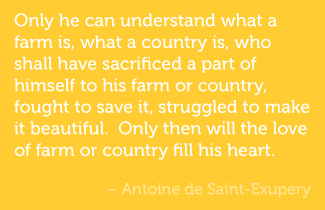 |
| |
|
|
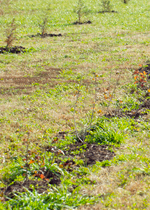 |
|
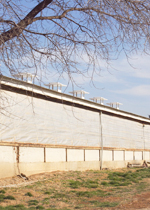 |
| Saplings planted as a windbreak around a pig barn. |
|
Utilizing natural ventillation makes pig barns more green. |
| |
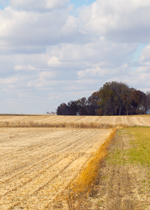 |
|
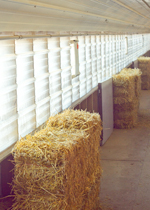 |
| Midsized family farms grow their own feed ingredients. |
|
Natural lighting improves the internal environment. |
|